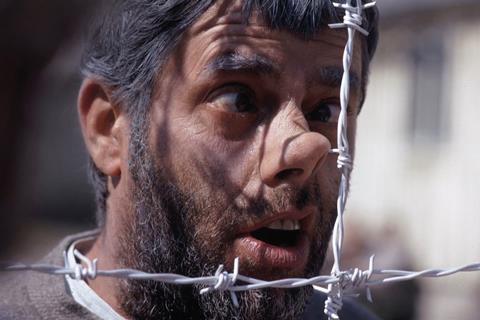
Jerry Lewis was a Hollywood legend but he also inspired Hollywood myth for five decades as rumours swirled around his controversial dramatic film, The Day The Clown Cried, which has never seen the light of day.
Lewis promised on the talk-show circuit that the film would be released in 1972 – and then it just disappeared.
Until now. Directors Michael Lurie and Eric Friedler have unearthed raw footage from the original film’s shoot, heard Lewis’s honest reflections before he died, and solved some of the mysteries surrounding The Day The Clown Cried in their new documentary From Darkness To Light, which premieres in Venice on September 1 and is sold by The Syndicate.
Friedler’s interview with Lewis – who died in 2017 at age 91 – was the starting point for the documentary. Friedler, the Australia-born, German-based director of films like Wem Wenders: Desperado, remembers, “Jerry Lewis for me was always this big, iconic figure. There was always this myth about The Day The Clown Cried, this film he had started and nobody knew if he finished it or not. There was always this legend and this myth. Of course it’s interesting to speak about one of the last big taboos in movie history.”
Lewis didn’t live up to his cantankerous reputation during their interview, thankfully. The director recalls, “I was afraid that he would not answer all the questions, but he did. I think it was the right time, the right space, the right atmosphere [for Lewis to open up]. I had the feeling that it was somehow a testimony for him to speak about this story.”
Lewis had a flourishing comedy career in the early 1970s, when he wanted to spearhead a project that would show off his more serious acting and directing skills. The Day The Clown Cried would be a US-French-Swedish production about a German clown imprisoned in a concentration camp who tries to entertain children on their way to the gas chambers. The film did start shooting in Europe, but there were production and rights issues, and Lewis wasn’t at all happy with how the film was turning out creatively – so he walked off the set, taking the film reels with him and supposedly never completed the film. It became one of the film world’s great lost films.
From Darkness To Light, a US-Germany co-production, weaves together interviews with never-before-seen production footage, unearthed at a Swedish film lab and restored; Lewis gave his blessing for the footage to be seen before he died.

Lurie, a longtime US producer and executive producer who moves into directing, adds, “It started from Eric’s interview. We had known that no one knew what happened with the film, and having this extensive interview with Jerry Lewis, explaining in detail everything that happened and his experiences, we thought we could build a documentary from there. That’s how we all decided to work together to do this. It’s been a bit of a journey.”
Starting in 2020 the team dug around to uncover the truth about this mysterious film. Producer Thore Vollert says, “We did a lot of research and the story kept growing from there.”
Adds Friedler, “To us, the most surprising and enticing thing was peeling back layer after layer, and always finding new documents supporting this and that theory, and getting behind what might have happened years ago, what might have actually ruined a maybe great movie that never came out.”
As well as access to Lewis, the team shot exclusive interviews with, among others, the original film’s actor Pierre Étaix, DoP Rune Ericson, and Lewis’ long-time friend and collaborator Martin Scorsese.
The documentary’s footage from the 1972 shoot is not necessarily the takes that would have ended up in the final film. “It’s more footage from rehearsals, disjointed samples and sequences,“ says Vollert. “It’s rushes and dailies that were never assembled to make a feature.”
Lewis donated some of the film materials to the US Library of Congress but it’s not known exactly what footage they have and if they will release it in 2025 as predicted. Friedler isn’t holding his breath: “Nobody knows if there’s a finished film or not…but I don’t think we’ll ever get to see the full movie.”
If The Day The Clown Cried could have been released in 2024, could it have worked? Fieldler says, “It’s a speculation, because we just saw fragments, and some of it is very good filmmaking, high quality, very good acting, very good directing. And some of it, you don’t know what he was up to. It’s difficult to say now what the film at the end would have looked like. But he was ahead of his time, and he didn’t have a blueprint for the subject. We didn’t have all these other films about the Holocaust. He was stepping into the dark.”
Lurie adds, “Who knows, maybe it could have been wildly successful, because it would have been the first? That’s what intrigued us about the story.”
Even for audiences who don’t know much about Lewis or have never heard of this ‘lost film’, Vollert feels the documentary “is timeless… It’s about a filmmaker venturing forth and risking a lot of things way before his time. I think ultimately, he didn’t end up failing but decided that he wouldn’t be able to live up to his own expectations and ambitions, which is courageous in its own way.”
























No comments yet